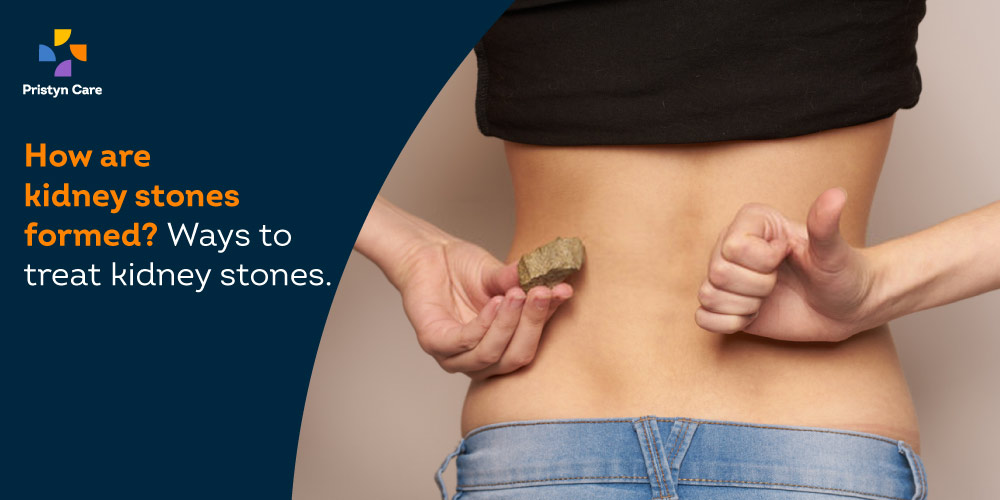![]() Views: 920
Views: 920
How Are Kidney Stones Formed? Ways to Treat Kidney Stones
However, when the concentration of fluid is less than the waste in the urine, the latter forms crystals which settle down as stones. These crystals or kidney stones are sometimes small enough to get expelled out of the body through urine or may grow bigger in size. .
Dedicated Support at Every Step!
Our Doctors are available 24 hours a day, 7 days a week to help you!
Kidney stones can also get stuck in different organs around the kidneys such as the ureter, upper calyx, urinary bladder, etc. If kidney stones are left untreated for a long duration can cause unbearable pain due to its movement inside the body. Sometimes, stones take the shape of the kidneys and resemble the horns of a stag and hence the term, staghorn calculus. These are usually large stones that cover a significant portion of the kidneys.
What Constitutes Kidney Stones?
There are several salts and minerals that are found in different types of kidney stones. Renal stones are mostly made up of calcium and oxalate that account for almost 80% of all renal stones. Phosphate is also a key ingredient of kidney stones, followed by uric acid and struvite, usually occurring in 5-10% of cases. Cystine and xanthine occur in less than 1 percent of all kidney stones and are pretty rare.
No Cost EMI, Hassle-free Insurance Approval
How to Treat Kidney Stones?
Kidney stone is a common disease that can remain silent for a long period. Symptoms of very small stones can be silent and usually flush out on their own. However, some renal stones can cause excruciating pain. Kidney stones treatment is usually done based on these parameters -
- Size
- Location
- Number of stones
Since the thickness of the ureter is not more than 4mm, stones less than 4mm in size usually do not require surgical procedures. The doctor usually recommends drinking enough water and prescribes medications to reduce the pain. Several over-the-counter medications, such as ibuprofen (Advil, Motrin IB), acetaminophen (Tylenol), or naproxen (Aleve), can help reduce the pain until the stones are completely flushed out of the body. Urologists also recommend some alpha-blockers, which relax the muscles in the ureter for quicker expulsion of the stone.
For stones greater than 5mm, surgical procedure is inevitable. Surgical or less invasive procedures are regarded as the most effective way to treat kidney stones that are resistant to medications or other home remedies. Doctors usually recommend four surgical procedures for kidney stones based on their size and location -
- Shock wave lithotripsy (ESWL)
- Laser surgery (RIRS)
- Ureteroscopy (URSL)
- Laparoscopic surgery (PCNL)
- Extracorporeal Shock Wave Lithotripsy (ESWL) - It is a non-invasive surgery that uses external shockwaves to break the stones into smaller pieces. A viscous fluidic medium between the machine and the body helps break the stones into smaller fragments. The patient is administered spinal anesthesia to reduce the pain as the stones are flushed out of the body. ESWL is a conventional procedure that may require multiple sittings to completely break the stones.
- Retrograde Intrarenal Surgery (RIRS) - RIRS uses a flexible endoscope that is inserted into the bladder through the urethra. The scope is moved up to the urinary tract system (retrograde movement) to locate the stone. Once the location is determined, the surgeon uses a laser probe to crush or manipulate the stones. The surgeon may use small forceps in case of large stones to grab them. The smaller stone fragments are removed or flushed out through urine. This procedure is effective for kidney stones of sizes between 8mm to 15mm. The patient is under spinal or general anesthesia throughout the procedure and does not feel any pain. The surgeon may choose to insert DJ stents before RIRS surgery. Stents enlarge the passage of the ureter for smooth movement of stones that cause less pain. The stents are removed once the stones are completely flushed out of the body.
- Ureteroscopic Lithotripsy (URSL) - Similar to RIRS, ureteroscopic lithotripsy also uses a thin ureteroscope that is attached to the camera and laser on the other end. URSL is also an effective surgical option for medium-sized stones. The patient is administered with local or general anesthesia for a minimal pain procedure. The camera attached to the ureteroscope guides the surgeon inside the body to locate and break the stones. If the size of kidney stones is larger in size, they are physically removed using microforceps. The urologist inserts ureteral stents to ease the movement of stone during the expulsion.
- Percutaneous Nephrolithotomy/Nephrolithotripsy (PCNL) - PCNL is an advanced procedure to treat kidney stones of size greater than 14mm. It is also known as tunnel surgery due to the nature of small incisions. It involves small incisions near the flank area while the patient is under general anesthesia. The surgeon then uses a nephroscope to locate and break the stones into smaller pieces. If the stone is removed in its intact state, it is called nephrolithotomy, and if the stone is broken into smaller fragments, it is termed nephrolithotripsy.
Conclusion
Kidney stone is a common condition that affects around 15% population in India. Renal stones are mostly composed of oxalate, calcium, uric acid, cystine, etc., and occur due to an excess animal protein, calcium supplements, oxalates, etc. Therefore, certain dietary restrictions and lifestyle changes can prevent the formation of renal stones.
Read more: Foods To Avoid With Kidney Stones
There are four effective treatment options for renal stones that are often based on the size, number, composition, and location of the stones. The cost of ESWL starts from Rs. 40,000. Similarly, the cost of PCNL starts from Rs. 60,000, RIRS starts from Rs 95,000, and the cost of URSL starts from Rs. 40,000. However, the overall cost of treatment varies depending on several factors such as selection of hospital, consultation fee of the surgeon, medications cost, etc.
You can opt for several medications and home remedies in case of small-sized kidney stones that are usually flush out on their own. However, in the case of large stones, different surgical procedures can immensely help with the pain and several symptoms. The recovery may take some time depending on how long it takes for the stone to completely flush out. Therefore, following post-operative care is important for quick and smooth recovery.










